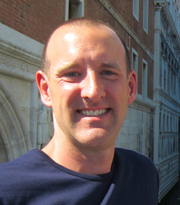 A Charles Sturt University (CSU) academic has added his voice to calls by a range of health sector bodies for the federal government to fund universal coverage of paramedic ambulance services in Australia.
A Charles Sturt University (CSU) academic has added his voice to calls by a range of health sector bodies for the federal government to fund universal coverage of paramedic ambulance services in Australia.Mr Joe Acker, paramedic lecturer at the School of Biomedical Sciences at CSU in Port Macquarie, said, “Having this essential service available for all citizens is important because we don’t want severely ill or injured patients not calling an ambulance because they can’t afford it.
“Furthermore, time-dependant illnesses such as heart attacks, stroke, or major trauma require rapid attention or they can cost individuals and the health system even more later on.”
Mr Acker was commenting after several health organisations - the Consumers Health Forum, the Heart Foundation, the Stroke Foundation, the Australian Healthcare and Hospital Association, and Paramedics Australasia - called for free nationwide emergency medical services.
Mr Acker is disappointed that federally funded paramedic ambulance services haven’t been introduced earlier.
“In an emergency, paramedics save lives and can help speed patient recovery. Those who do not call 000 in an emergency because they cannot afford personal cover through a health fund are discriminated against by the existing system and risk their lives and the prospect for a faster, full recovery.
“This is an equity issue. It is just good, sensible policy to have centrally-funded paramedic services with national standards that are fairer for all Australians.
“Compared to other countries, Australia is in a perfect position to have federal standards and centralised funding for ambulance services.
“In Canada and the US there are a wide range of organisations providing paramedic services including fire brigades, hospitals, and private companies. There may be several different paramedic services in one city and literally dozens in one state or province; this makes it very difficult to have a central funding source. In Australia, there is one public paramedic service provider in each state and most of these are part of the state health system, this makes funding relatively easy.”
Mr Acker notes that paramedics no longer only provide a fast trip to the hospital in an ambulance. He believes that extended care paramedics and community paramedics have the ability to provide a range of important services to patients living in rural and remote communities who don’t have access to the same health services as people living in cities.
“If a community doesn’t have a diabetic nurse or a GP, why not have the community paramedics make a house call to monitor a diabetic patient’s blood sugar and take care of any other complications of diabetes? Instead of having a patient leave the aged care centre to go to a busy emergency department for sutures or wound care, why not have the community paramedic go right to the bedside to close the wound, apply the dressings and administer the IV antibiotics?”
Mr Acker says that investment into extended care paramedic and community paramedic programs would further save the system money and potentially take the load off busy hospitals by safely and effectively treating patients at home.
“This also aligns with and supports the professionalisation of the paramedic discipline, and moves to establish national standards, accreditation and registration,” he said.





Social
Explore the world of social